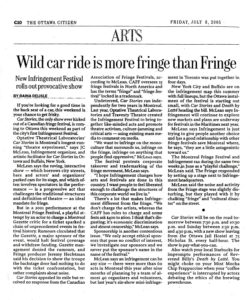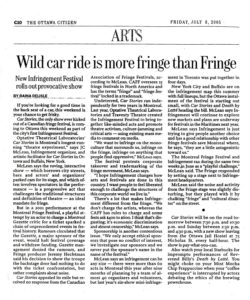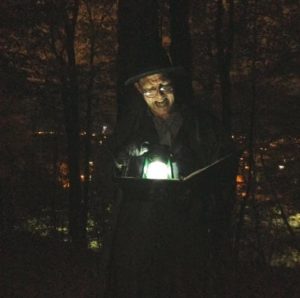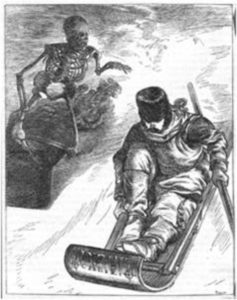Dear Ms. Shona McCarthy,
Firstly, my congratulations on your recent appointment as the CEO of the Edinburgh Festival Fringe Society. I wish you all the best in your role and hope we can work together to resolve some longstanding issues at the Fringe.
My name is Donovan King and I am a professional actor, cultural worker and a school teacher from Montreal.
I attended the World Fringe Congresses in Edinburgh in 2012 and 2014 after being invited as a representative of the infringement festivals. Infringement festivals are Fringe festivals that have been threatened with legal action by people claiming to hold a Fringe trademark, so have used the name infringement to avoid being sued. The word “infringement” simultaneously questions the trademarking of the Fringe, a grassroots festival that was created by artists for artists as a protest against exclusion during the original Edinburgh Fringe of 1947.
I am writing you today in regards to some serious problems with the third World Fringe Congress, being held in my home city of Montreal. I would like to explain why I feel you should intervene as the CEO of the Edinburgh Festival Fringe Society. The story is a bit complicated, so I have tried to make it as clear as possible.
Backstory: Fringe politics and trademark issues in Montreal and Buffalo
Fringe politics is a very common topic among artists in Montreal due to the trademarking of the word and subsequent exclusion of artists, which has resulted in a major cultural battle for over 15 years now. In a nutshell, artists who are unhappy with the trademarked St. Ambroise Fringe have been challenging it artistically through culture-jamming, whereas the St. Ambroise Fringe has responded with the exclusion of activist artists, including calling the police on them whenever they protest (despite the fact that in Canada our right to protest is protected by our Constitution). Instead of engaging in dialogue with critical artists to resolve thorny issues, the St. Ambroise Fringe has consistently attempted to exclude them and paint them as dangerous.
The infringement festival was created in 2004 in Montreal after the St. Ambroise Fringe kicked artists out of the festival in 2001, allegedly on orders of then corporate sponsor Can-West Global, a media company that produced newspapers such as the Montreal Gazette. When the Gazette’s theatre critic was offended by a critique of her behaviour (she had demanded a free ticket to the experimental play Car Stories), she stopped reviewing the entire festival until the offending artists were ejected.
This corporate sponsor was in a clear conflict-of-interest as both a media outlet reporting on the festival and a corporation financing it. To make matters worse, the St. Ambroise Fringe refused to pay artists their ticket sales after a sold out week or reimburse the hefty registration fee they charged to be associated with the Fringe trademark.
The infringement festival spread to Buffalo the following year after local artists there were threatened with legal action from the NYC Fringe, who claimed to hold a Fringe trademark. According to Dr. Xela Batchelder, the world’s leading academic on Fringe theatre, this was a falsehood – the NYC Fringe has never held a Fringe trademark.
Furthermore, the Canadian Association of Fringe Festivals (CAFF) also threatens legal action against students and independent artists who attempt to use the word “Fringe” without their permission.
As I hope you will agree, the idea of a Fringe trademark is the very antithesis of the original Fringe. It results in the exclusion of Fringe artists and students from participating in a form of populist arts and forces them to rename the festival if they want to carry on with their artistic activities. A trademark on the word “Fringe” is extremely problematic and damages the festival by compromising its authenticity and preventing artists from performing – all in the name of corporate interests. It is an issue that needs to be urgently debated, in my opinion.
Issue: Exclusion at third World Fringe Congress
Getting back to the World Fringe Congress, I had the pleasure to attend in Edinburgh in 2012 and 2014 after being invited by the founder, Holly Payton-Lombardo. My work at the Congress included writing a critical analysis about problems facing the Fringe internationally in 2012, followed by a workshop in 2014 called “A World Fringe Philosophy” where I outlined some of the more problematic issues for Fringe Managers. I even did a show at the Edinburgh Fringe called Critical Report from the World Fringe Congress, which has also played in other cities in the U.K., Ireland, the U.S.A. and Canada.
I was very excited at the prospect of attending the 2016 Congress to continue the conversation in my home city and to try and finally resolve some of the issues, such as the Fringe trademark in Canada that prevents artists from participating or the fact that ticket sales still have not been paid, 15 years later.
For the third Wold Fringe Congress, I had also intended to propose inviting a workshop on strategies to ensure safe(r) festivals after incidents of sexual assault and discrimination against people with disabilities at CAFF Fringe festivals came to light recently. The fact that people feel unsafe at Canadian Fringe festivals needs to be addressed, in my opinion, with the goal of creating policies to ensure the safety of all participants.
Unfortunately, the CAFF-hosted World Fringe Congress has rejected all local Montreal infringement delegates from attending without providing much reason.
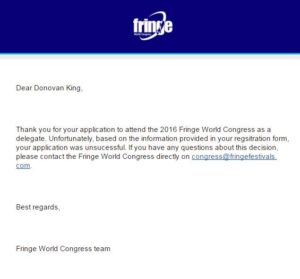
This, despite the fact I helped set up the original Fringe Festival here (before it was trademarked), and then established the infringement festival to try and challenge the perceived co-opting of our Fringe by corporate interests. To be excluded in my own city is really hurtful, to be honest, especially after I invested all that time and money going to Edinburgh in 2012 and 2014 to be included in the important discussions.
I didn’t realize that the St. Ambroise Montreal Fringe’s exclusion of artists would extend to the World Fringe Congress.
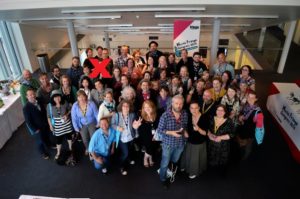
Furthermore, to make matters worse, everyone who applied from the Buffalo infringement festival was also rejected. I find it really unfortunate that my colleagues in Buffalo are being rejected simply for being associated with me.
It is important to remember that these artists simply wanted to do Fringe theatre until they were threatened by the Fringe in NYC, who claimed to control a Fringe trademark. Instead, they started an infringement festival, just like we did because of the Canadian trademark that prevented us from doing a populist form of arts we have been doing since we helped found the Fringe in Montreal. We are about as Fringe as it gets – if people won’t let us play in their “official” festival, we are going to do it ourselves, just like the artists who invented the Fringe Festival in the first place.
Ironically, this is the exact same thing that happened in Edinburgh in 1947, but now the Fringe is cast in the role of the Edinburgh International Festival that it had originally protested against.
The American artists from Buffalo didn’t do anything objectionable and don’t deserve to be excluded. I find their treatment by the St. Ambroise Fringe and CAFF to be extremely disturbing, to be honest. These artists have never even attended a Canadian Fringe Festival, let alone culture-jammed one. Why are they being banned from participating?
Issue: Purpose of World Fringe Congress is being compromised
It is important to remember that founder of the World Fringe Congress, Holly Payton-Lombardo, stated in 2012 the purpose of her creation: “…the Congress will recognize that there are many models of Fringe and many different ideas within it, without recognizing any one model, concept or Fringe as more valid than another.” Furthermore, Holly stated that the Congress was designed “to create a lasting network and a real sense of how Fringes can work together to achieve all our aims.”
Far from working together to achieve our collective aims, the Congress is now banning artists who do not comply with a corporate model of Fringe. My fear is that the CAFF World Fringe Congress will focus mostly on persuading other festivals to become more and more corporate now that they have silenced all the critical voices through exclusion. If nobody from infringement is allowed to speak to these issues, the legitimacy of the World Fringe Congress must be called into question.
The CAFF has arguably changed the purpose of the Congress to exclude models that are based on the real Fringe Festival of 1947 in favor of more corporate models, which effectively excludes Montreal and Buffalo artists who voice critical opinions. I find it sad and unfortunate that Holly’s creation has been compromised like this and I hope there will be some serious discussion in Edinburgh and pressure applied to restore it to its original purpose.
As the CEO of the Edinburgh Festival Fringe Society, presumably one of your responsibilities it to safeguard and oversee the Fringe’s brand. Many people feel that the Fringe brand is at risk internationally due to the trademarking issue, which has now resulted in the exclusion of some of the most dedicated Fringe artists on the planet. Their voices are being excluded from an important conversation about Fringe festivals and, on a larger scale, about culture itself.
Proposed resolution
The way I see it, if Fringe stakeholders don’t start tackling these issues now, things are only going to get worse and worse. The behavior of managers at both the NYC Fringe and CAFF is very exclusionary and is harming the Fringe’s brand on a global level. It is always the same thing: for financial reasons, the administrators want to have complete control of the Fringe, so they use disingenuous techniques, such as trademarking and legal threats, to try and charge artists hefty fees for participating. This type of behavior should have no place in the world of Fringe arts, where the artists traditionally came first because they invented the festival in the first place.
I hope that the Fringe community is mature enough to hold an adult discussion about the issues I have raised, with the goal of protecting the Fringe and its participants from the types of corporate manipulation and discrimination I have outlined.
Furthermore, it is illegal in Quebec to discriminate based on political convictions, including activism, and the government has strong Human Rights legislation in place to challenge exclusion of various sorts. That being said, I am hoping these issues can be resolved through dialogue.
As such, I am asking you to intervene and to overturn the decision to ban all Montreal and Buffalo infringement artists from the CAFF-hosted third World Fringe Congress.
Lastly, like the original Fringe artists of 1947, we are challenging our own exclusion. We have decided to take matters into our own hands by creating parallel events. I would like to invite you to the first-ever World Infringement Congress on Saturday, November 19, in Montreal.
As part of the Montreal Infringement Festival, running from November 15 – 20, the happening will explore important issues likely being excluded from the CAFF World Fringe Congress. In attendance will be some of the world’s leading Fringe artists and academics, local arts activists and community leaders. You are most welcome to attend to be a part of the conversation, as are all the other Fringe Managers. Unlike the CAFF World Fringe Congress, we believe in diversity, inclusion and critical thinking.
Thank you for your attention to this important issue.
Sincerely,
Donovan King, B.F.A., B.Ed., M.F.A.
The response:
Dear Donovan
Thank you for your email regarding the Fringe World Congress.
As you know, the Fringe World Congress is an Edinburgh Festival Fringe Society event which has twice taken place in Edinburgh. The purpose of the event is to bring Fringe organisers of the world together to discuss and learn from each other, from an operational, artistic and philosophical perspective. Although the Edinburgh model – open access, non-curated – is the original Fringe model, it is by no means the only model and that is the essence of the conference. We ourselves have multiple models within the Fringe which coexist to the benefit of both participants and audiences, and we welcome open discussion and debate without prejudice on the benefits and flaws of differing models and how to manage them operationally.
In terms of the 2016 Congress, which will take place in Montreal, hosted by the Festival St-Ambroise Fringe de Montreal, contractually the running of the event is the responsibility of the Canadian Association of Fringe Festivals and Festival St-Ambroise Fringe de Montreal which includes the decision on delegate attendance. As a result, we can certainly voice an opinion on decisions made but ultimately it is a decision for the Canadian Association of Fringe Festivals and Festival St-Ambroise Fringe de Montreal to make.
With kind regards
Elizabeth
Elizabeth Burchell
Head of Marketing & Sponsorship
Edinburgh Festival Fringe Society
Sent from my iPhone

